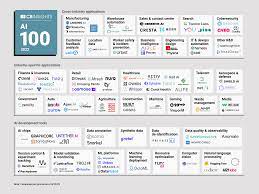Artificial Intelligence Companies: Shaping the Future
In recent years, artificial intelligence (AI) has emerged as one of the most transformative technologies across various industries. From healthcare to finance, AI companies are at the forefront of innovation, developing solutions that are revolutionizing how we live and work.
The Rise of AI Companies
The rapid advancement in AI technologies has led to the proliferation of companies dedicated to harnessing its potential. These companies range from tech giants with vast resources to innovative startups focused on niche applications.
Tech Giants Leading the Charge
Major technology companies like Google, Microsoft, and IBM have been investing heavily in AI research and development. Google’s DeepMind is renowned for its breakthroughs in machine learning and neural networks, while Microsoft’s Azure AI platform provides tools for businesses to integrate AI into their operations seamlessly.
Innovative Startups Making Waves
Apart from established players, numerous startups are making significant contributions to the field of AI. Companies like OpenAI are pushing boundaries with their work on natural language processing and machine learning models. Meanwhile, startups like UiPath focus on robotic process automation (RPA), helping businesses automate repetitive tasks efficiently.
Applications Across Industries
AI companies are not limited to a single sector; their technologies have applications across a wide range of industries:
- Healthcare: AI is being used to develop predictive analytics for patient care, streamline administrative processes, and even assist in complex surgeries using robotic systems.
- Finance: Financial institutions leverage AI for fraud detection, algorithmic trading, and personalized financial advice.
- Retail: Retailers use AI for inventory management, customer service chatbots, and personalized marketing strategies.
- Automotive: The development of autonomous vehicles relies heavily on advancements in AI technology for navigation and safety systems.
The Challenges Ahead
While the potential of AI is immense, it also presents challenges that need addressing. Ethical considerations around data privacy and bias in algorithms are crucial areas that companies must navigate carefully. Moreover, as automation becomes more prevalent, there is an ongoing debate about its impact on employment.
The Future Outlook
The future looks promising for artificial intelligence companies as they continue to innovate and expand their capabilities. As technology evolves, we can expect even more groundbreaking applications that will further integrate AI into our daily lives.
The journey ahead is both exciting and challenging. With continued investment and ethical considerations at the forefront, AI companies have the potential to reshape our world positively.
Exploring the Role and Impact of Leading Artificial Intelligence Companies: Key Questions Answered
- What are the top artificial intelligence companies in the industry?
- How are artificial intelligence companies using AI to innovate?
- What industries benefit most from the solutions provided by AI companies?
- What challenges do artificial intelligence companies face in their operations?
- How do artificial intelligence companies address ethical concerns related to AI technology?
- What is the future outlook for artificial intelligence companies and their impact on society?
What are the top artificial intelligence companies in the industry?
When discussing the top artificial intelligence companies in the industry, several names consistently stand out due to their groundbreaking innovations and significant contributions to the field. Tech giants like Google, with its DeepMind division, and Microsoft, through its Azure AI platform, are leaders in AI research and development. IBM is renowned for Watson, its AI system that excels in natural language processing and data analysis. Additionally, companies like Amazon leverage AI for enhancing customer experiences through Alexa and personalized recommendations. In the startup realm, OpenAI is making waves with its advanced machine learning models, while UiPath focuses on robotic process automation to streamline business operations. These companies are at the forefront of AI technology, driving advancements that are shaping various industries globally.
How are artificial intelligence companies using AI to innovate?
Artificial intelligence companies are leveraging AI to drive innovation across various domains by developing advanced algorithms and machine learning models that enhance decision-making processes, automate repetitive tasks, and improve user experiences. These companies are creating AI-powered tools that analyze vast amounts of data to uncover insights, predict trends, and optimize operations. In sectors like healthcare, AI is being used to develop predictive analytics for early disease detection and personalized treatment plans. In finance, companies are utilizing AI for fraud detection and risk management. Additionally, AI is transforming customer service through intelligent chatbots and personalized recommendations in retail. By continuously pushing the boundaries of what AI can achieve, these companies are not only improving efficiency but also opening new avenues for growth and development across industries.
What industries benefit most from the solutions provided by AI companies?
Artificial intelligence companies offer solutions that significantly benefit a wide range of industries, with some of the most notable impacts seen in healthcare, finance, retail, and manufacturing. In healthcare, AI is used to enhance diagnostic accuracy, personalize treatment plans, and streamline administrative tasks. The finance industry benefits from AI through improved fraud detection systems, algorithmic trading platforms, and personalized customer service. Retailers leverage AI for inventory management, customer experience enhancements through chatbots and recommendation engines, and demand forecasting. In manufacturing, AI optimizes production processes through predictive maintenance and quality control systems. These applications demonstrate the transformative potential of AI across various sectors by improving efficiency, reducing costs, and enhancing customer experiences.
What challenges do artificial intelligence companies face in their operations?
Artificial intelligence companies face several challenges in their operations, including ethical concerns, data privacy issues, and the need for extensive datasets to train their models effectively. Ensuring that AI systems are free from bias and make fair decisions is a significant hurdle, as biased algorithms can lead to unfair outcomes. Additionally, these companies must navigate complex regulatory environments that vary across regions, which can impact the deployment of AI technologies. The rapid pace of technological advancement also requires continuous innovation and adaptation to stay competitive. Moreover, attracting and retaining skilled talent in a highly specialized field remains a constant challenge for many AI firms.
How do artificial intelligence companies address ethical concerns related to AI technology?
Artificial intelligence companies address ethical concerns related to AI technology by implementing a variety of strategies aimed at ensuring responsible development and deployment. These companies often establish dedicated ethics boards or committees to oversee AI projects, ensuring that ethical guidelines are integrated into the design and implementation processes. They prioritize transparency by making their algorithms and data sources more accessible for review, which helps in identifying and mitigating biases. Additionally, many companies collaborate with academic institutions, industry peers, and regulatory bodies to develop standards and best practices for ethical AI use. Regular audits and impact assessments are conducted to evaluate the societal implications of their technologies, ensuring that AI systems operate fairly and without discrimination. By fostering open dialogue with stakeholders and investing in ongoing research on the ethical dimensions of AI, these companies aim to build trust and promote the responsible use of artificial intelligence.
What is the future outlook for artificial intelligence companies and their impact on society?
The future outlook for artificial intelligence companies is remarkably promising, as they continue to innovate and expand the capabilities of AI technologies across various sectors. These companies are poised to drive significant advancements in areas such as healthcare, finance, and transportation, leading to more efficient and personalized services. As AI becomes more integrated into daily life, its impact on society is expected to be profound, offering solutions to complex problems and improving quality of life. However, this growth also brings challenges, including ethical considerations around data privacy and the potential displacement of jobs due to automation. Balancing innovation with responsible practices will be crucial for AI companies as they shape the future landscape of technology and society.


